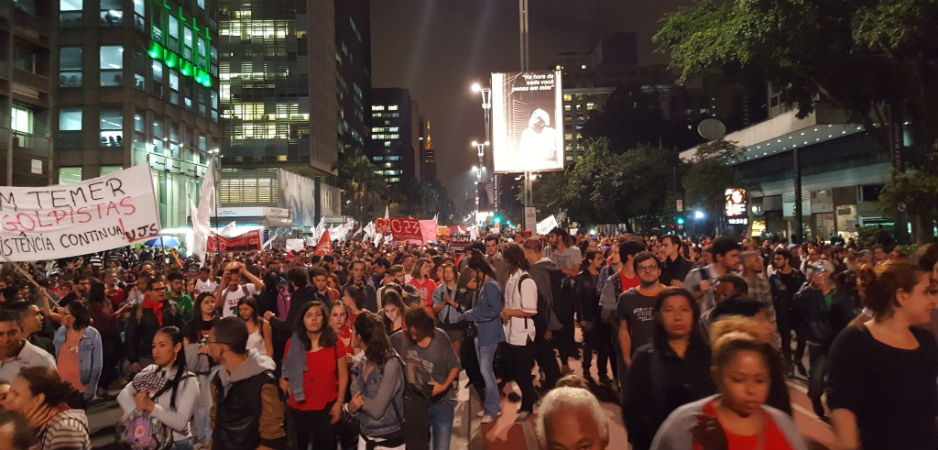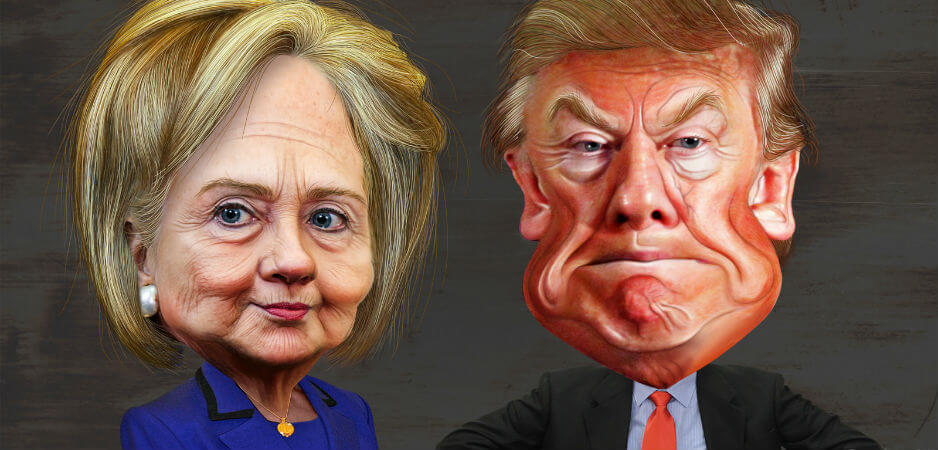Brazil’s economic downturn and political turmoil will exacerbate existing problems such as poverty, inequality and crime.
For many in the world, Brazil is the land of Pelé and o jogo bonito, or the beautiful game, as Brazilians call football. It is also home to the Amazonian rainforests, providential natural resources, carnival, samba and hauntingly melodious music. To outsiders, the world’s fifth largest country, both by area and population, seems sensuous, joyous and glamorous. Yet not all is well in paradise.
In the late 1930s, Stefan Zweig visited Brazil and called it the “land of the future.” Writing from war torn Europe, Zweig had high hopes for the future of this multiracial land. His hopes have since been repeatedly dashed. As per the Center for Public Security and Criminal Justice, of the 50 most violent cities in the world, 19 are Brazilian. Unemployment has risen to nearly 11%, wages are falling and inflation of 10.6% is a 13-year high. In 2015, Brazil’s economy shrank by 3.8%, vying with Russia as the worst performing major economy of the year.
Political turmoil has accompanied economic meltdown in the South American giant. Both houses of Brazil’s National Congress have voted to begin an impeachment trial against Dilma Rousseff, who is now suspended from the presidency for the next 180 days whilst the trial lasts. She is accused of illegally manipulating government accounts in 2014 before her reelection. Apparently, loans from public banks to the treasury artificially enhanced the budget surplus.
Vice President Michel Temer has taken over. He is a wily constitutional lawyer “known for his quiet yet calculating demeanor, fine suits, and a penchant for poetry.” The 75-year-old’s rather sensual book of verses, Anonymous Intimacy, is supposedly inspired by his third wife, who is 43 years younger than him and a former beauty queen. This youngest of eight children of Maronite Lebanese immigrants heads the Brazilian Democratic Movement Party (PMDB) that had an alliance with Rousseff’s Workers’ Party (PT). Now, Temer has thrown Rousseff under the bus and appointed Brazil’s first all-male and all-white cabinet since the end of the military dictatorship in 1985.
In a brilliant article in The Guardian, Jonathan Watts describes how Temer has plotted to oust Rousseff. Many see the wily lawyer as “the Captain of the Coup” and for good reason. In December, Temer penned a letter to Rousseff that began dramatically with a Latin proverb: Verba volant, scripta manent, “Words fly, writings remain.” This supposedly confidential letter was conveniently leaked to the public, ratcheting the pressure on Rousseff and preparing the path for her impeachment. In April, he followed this letter with a WhatsApp recording of a speech outlining Brazil’s need of a “government to save the country.”
Temer has proved to be a real-life Frank Underwood of the popular television series, House of Cards. The only difference is that Temer is far more colorful, both in his political machinations and luscious love life. For two decades, he has been kingmaker in a system characterized by institutional corruption. As Watts writes, Temer has been “described as the ‘godfather’ who secured the appointments of key figures in the ongoing Petrobras scandal.” Temer and his party, PMDB, have avoided ideological positions. They have chased patronage, prestige and bribes with aplomb.
Temer is a fitting leader of a country where the political elite has a reputation for rapaciously robbing its people. Andrew Jacobs of The New York Times called Brazil’s graft-prone congress a circus that even has a clown. This legislator named Grumpy had the last laugh by getting 1.3 million votes, the highest in the country. Fellow members of Grumpy’s circus include aging football stars, suspects accused of murder and drug trafficking, and some bearded men who purportedly lead a women’s movement. To add insult to injury, one of the members of the Party of the Brazilian Woman was accused of sexually abusing his young niece.
Eduardo Cunha, the previous speaker of the lower house, a PMDB politician and Rousseff’s bitter rival, did better. An evangelical Christian radio commentator with a penchant for tweeting biblical verses, Cunha was recently removed from his position by the Supreme Court because of charges that he had siphoned off millions to Swiss bank accounts. Brazil’s circus is far more entertaining than House of Cards. Truth is indeed stranger than fiction.
Many emerging economies and poorer countries have problems similar to Brazil’s. In these countries graft is a way of life. People vote but do not participate in running the county. They fail to come together to create and administer public goods such as schools, hospitals, roads et al. The taxes they pay are stolen by corrupt elites. Because taxes are stolen, most evade taxes. This in turn enables tax collectors to extort bribes from citizens. Voters with little trust are often trapped between elitist reactionaries and power-hungry populists.
It is little surprise that states are failing and flailing in many parts of the world. In Brazil—as in India or Nigeria—the state barely functions because it is too diverse and disconnected from people’s lives. Like many other societies, Brazilians sip deeply from the poisoned chalice of the past. This is a former Portuguese colony where white settlers slaughtered natives, helped themselves to gold, silver, timber et al, and imported slaves from Africa to work on sugar plantations.
Bizarre to go to bed in a country with a center-left government, then wake up with a right-wing one, with no election in between. #Brazil
— Glenn Greenwald (@ggreenwald) May 13, 2016
Brazilians repeatedly point out that they are a multiracial and multicultural society. Indeed, the story of Pelé would not be possible in lily white Argentina where many still hark back to their European roots and look down on people with more melanin in their skin. In Brazil, class and wealth instead of race and religion matter more, but it turns out that those at the top of the food chain tend to be disproportionately white. It is for this reason that Watts says, “Brazil’s image as a socially liberal, multi-ethnic democracy may always have been more myth than reality.”
While Brazil did castoff the colonial yoke of Portugal by 1825, it never attained the political stability of English colonies like Australia, Canada and the United States. Turmoil has plagued it to this day. Some smart alecks from the Central Intelligence Agency (CIA) blame geography. They point out that it lacks the harbors, rivers and topography that allow for easy transportation of goods. The Grand Escarpment comes right down to the ocean, forcing cities to develop on small enclaves of relatively flat land. Tropical jungles and cerrado, a vast tropical savannah with acidic soils, do not help. Hence, as per this argument, Brazil still lacks a decent system of roads and railways. Throw in Max Weber’s ideas and you can blame Catholicism with its papal infallibility as a cultural barrier to economic dynamism and even democracy.
Whilst the gentlemen of the CIA might have a point, their agency has hurt Brazil perhaps more grievously than geography. In 1964, the CIA was terrified by the specter of spreading communism. Cuba had fallen. Vietnam was troubling and would soon consume resources. The US had to save Brazil from satanic communism. The CIA came up with Operation Condor. Killings, kidnappings, torture, imprisonment and brutal repression by South American military dictatorships were seen as messy means to the noble end of combating communism. One of those who was imprisoned and tortured during these days was Rousseff herself.
Only in 1985 did Brazil become a democracy. By 1992, it had impeached a president. Fernando Henrique Cardoso, first as finance minister and then as president, brought inflation under control at a time when the post-Soviet globalization was starting to take off. Cardoso’s measures increased consumption and created stability. At the same time, the Chinese economy grew stunningly throughout the 1990s and 2000s. As this author pointed out last year, Sino-Brazilian trade increased from little over $10 billion to $255.5 billion between 2000 and 2012, a rise of 2,550%. As China has sneezed, Brazil has caught a cold.
 During the boom years, interest rates were low, credit was easy and consumption based on monthly instalments for cars, refrigerators, cellphones and even good clothes de rigueur. In 2012, The Economist reported that credit in Brazil had doubled in 10 years. During the global recession, policymakers slashed taxes and interest rates to boost demand. Neither Rousseff nor her predecessor and mentor, Luiz Inácio Lula da Silva, were good stewards of the economy. Like grasshoppers and unlike ants, they failed to save for winter and Brazil is now drowning in debt.
During the boom years, interest rates were low, credit was easy and consumption based on monthly instalments for cars, refrigerators, cellphones and even good clothes de rigueur. In 2012, The Economist reported that credit in Brazil had doubled in 10 years. During the global recession, policymakers slashed taxes and interest rates to boost demand. Neither Rousseff nor her predecessor and mentor, Luiz Inácio Lula da Silva, were good stewards of the economy. Like grasshoppers and unlike ants, they failed to save for winter and Brazil is now drowning in debt.
Rousseff and Lula had won elections thanks to the support of the poor and focused on distributing largesse. They lacked vision, competence and, according to some, even integrity. Lula was affected by the Mensalão scandal. Monthly payments were apparently made to legislators to back the government. Operation Car Wash investigation during the Rousseff era revealed that Petrobas, a state-owned oil giant, overpaid construction companies who passed off some of that money to executives and politicians.
Many accuse of Lula and Rousseff of becoming too greedy after remaining in power too long. They are certainly guilty of populism and of sacrificing long-term interests for short-term gains. Yet they did make Brazilian politics a bit more democratic, plural and plebian. During their time, the Bolsa Familia Program made cash transfers to the poorest sections of society, helping reduce poverty as well as improving the health and education of children.
Like many other leaders around the world, Lula and Rousseff made terrible decisions regarding the Brazilian economy. Temer is no knight in shining armor though. He evokes terrifying ghosts from the past. With Temer’s rise to the throne, Brazil’s “bold old elite” has staged a stunning comeback. Already, ultra-conservative lawmaker Jair Bolsonaro has dedicated his impeachment vote to Carlos Alberto Brilhante Ustra, the dictatorship-era torturer-in-chief. Glenn Greenwald and The Intercept are right to point out that Brazil’s democracy itself is under threat as ruthless robbers take over the country’s safes.
*[You can receive “The World This Week” directly in your inbox by subscribing to our mailing list. Simply visit Fair Observer and enter your email address in the space provided. Meanwhile, please find below five of our finest articles for the week.]
The Media and the Fate of American Liberalism
If the rich and powerful get a voice and the rest of us do not, which direction is the nation likely to head in?
In spite of Bernie Sanders’ wins in Indiana and West Virginia, Hillary Clinton will almost certainly be the Democratic Party’s presidential nominee. This being the case, it may seem pointless to write about the media coverage of the election at this late stage. The biases run so deep and so clear that they have become yet another political reality that we simply take for granted. There may be some value, however, in discussing the possible results of this bias in the medium-to-long term, especially from the perspective of the Democratic race. What will it mean for American society in the future? What does it say about American society today?
In order to have this discussion, we should first lay some of the media bias out on the table. In debates, in newspapers and across… Read more
Reflections on Propaganda and Ideology in Everyday Life
The internet fulfills its promise to bring together diverse groups and encourage debate.
The World Wide Web is an opportunity for many different people and groups to find a public voice. But this diversity has had some unintended consequences. Faced with thousands of options for information and debate online, we often seek out like-minded people. The process is often aided by automated processes that recognize our preferences, online pages and services that we visit, and then suggest similar or related content to us. Cass Sunstein coined the phrase “the daily me” to describe how the web allows people to personalize their experience of information finding to such a degree that opposing or challenging ideas and identities become invisible to them.
Education is about exposing people to different life experiences, opinions and beliefs. A new type of online education offers the potential to do just that: using online platforms to explore differences of opinion and experience, without generating defensiveness… Read more
Caste Politics Overshadow Sanitation Issues in India
In India, traditional social structures impede development.
In his short treatise Sanitation in India published in 1912, Alexander Hubbard laid out suggestions to “brighten up [the] little world” of the Indian native which was drowned in “filth and squalor.” The treatise, while best described as patronising in its suggestions, partially succeeded in articulating a socio-cultural reasoning behind the poor sanitary conditions in India. It recognized that for sanitary reforms to succeed one needs to be aware of the “prejudices and superstitions” that afflict large parts of the native population. The British by the beginning of the 20th century had begun to view the problem of sanitation largely as a social issue. They were no longer concerned with the health of the soldiers alone, and the general good health of the public was seen as essential for the smooth functioning of the empire.
Despite having recognized the root of the problem, the government of India was unsure of the… Read more
America the Great is Only Months Away
Both Clinton and Trump promise a continuation of the notion that America can kill its way to a better world.
OK world, it is time for a wake-up call. It sure looks like “the greatest nation on Earth” is going to be led in the coming four years by either Hillary Clinton or Donald Trump. This will be good news for those in the greatest nation on Earth who drink the “greatness” Kool-Aid because that greatness is about the only thing the two of them agree upon. For those not living in the greatest nation on Earth, watch out. Each of these candidates has a plan for you, and neither plan includes asking you what you think about all of this.
So let me help out a bit. Let’s take Hillary first because she is easier to understand and has a long history of meddling in the affairs of other nations. She also sounds better when she says… Read more
Can Moldova Unite Against Corruption?
Growing dissatisfaction with the government unites Moldovan society.
On April 24, protesters in Chisinau’s main square carried posters with slogans of “Freedom” and “Down with Capitalism.” Unhappy with the current rulers and ongoing political crisis, over 5,000 people joined an anti-government rally in Moldova’s capital. Although critical of the elite, the demonstrators seemed to have polarizing views on where Moldova should be headed.
Protesters soon moved to the residence of Vlad Plahotniuc, Moldova’s richest oligarch and politician—nicknamed puppeteer for his influence over the government. His opponents accuse him of bribing deputies and affecting major political decisions in the country. As the protesters surrounded his house, hundreds of policemen (some armed) arrived to protect him. Six people were hospitalized after civilians clashed with law enforcement.
The latest protest is the continuation of other large-scale demonstrations that have shaken the country since 2015. A civil movement, known as Dignity and Truth, and a party of the same name lead… Read more
The views expressed in this article are the author’s own and do not necessarily reflect Fair Observer’s editorial policy.
Photo Credit: Eduardo Girao / Marcos Queiroz
 We bring you perspectives from around the world. Help us to inform and educate. Your donation is tax-deductible. Join over 400 people to become a donor or you could choose to be a sponsor.
We bring you perspectives from around the world. Help us to inform and educate. Your donation is tax-deductible. Join over 400 people to become a donor or you could choose to be a sponsor.
Support Fair Observer
We rely on your support for our independence, diversity and quality.
For more than 10 years, Fair Observer has been free, fair and independent. No billionaire owns us, no advertisers control us. We are a reader-supported nonprofit. Unlike many other publications, we keep our content free for readers regardless of where they live or whether they can afford to pay. We have no paywalls and no ads.
In the post-truth era of fake news, echo chambers and filter bubbles, we publish a plurality of perspectives from around the world. Anyone can publish with us, but everyone goes through a rigorous editorial process. So, you get fact-checked, well-reasoned content instead of noise.
We publish 2,500+ voices from 90+ countries. We also conduct education and training programs
on subjects ranging from digital media and journalism to writing and critical thinking. This
doesn’t come cheap. Servers, editors, trainers and web developers cost
money.
Please consider supporting us on a regular basis as a recurring donor or a
sustaining member.
Will you support FO’s journalism?
We rely on your support for our independence, diversity and quality.












